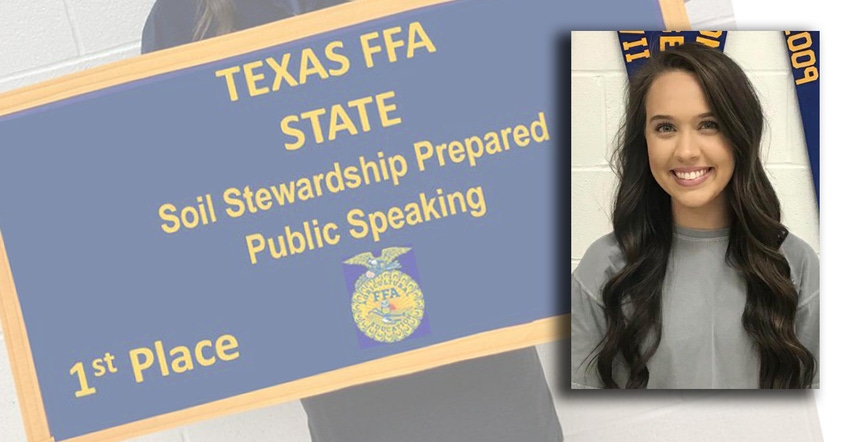
“Let me tell you about the birds and the bees and the flowers and the trees," opened 17-year-old Caroline Bacon in her state-winning FFA speech for the 2020 Soil Stewardship Public Speaking Contest.
Quoting lyrics written by Jewel Akens in his famous 1964 song, Bacon recited an eight-minute speech based on the theme "Where Would We BEE Without Pollinators?” The public speaking competition was held in July in conjunction with the 92nd Texas FFA State Convention.
"I started working on this in May," said Bacon, an upcoming senior at Harper High School. "With COVID, we weren't sure what was going to happen."
Once it was determined the public speaking contest and the convention would be held virtually, Bacon began researching pollination. To make it to state, she would have to place either first or second at Area.
"I worked on this for weeks preparing, writing, memorizing, and learning about pollination. I thought this is so much work, not knowing if I'd even advance."
Bacon, an active member of Harper FFA since her freshman year, said this was her first public speaking contest. She was anxious about competing against students who had participated in the past.
"Growing up, my parents made me talk to every person I encountered; I wasn't allowed to hide behind their legs. But I had never competed in public speaking in ag," she said.
Harper FFA Advisors Felice and Jason Marek guided her through the process.
"Caroline is such a good speaker," Felice said. "While at home because of quarantine, she kept texting me about the contest. She was determined she was going to do this."
With permission from the principal, Felice and Bacon frequently met at the high school to practice her speech. "She was persistent and so energetic. Everything I would tell her, she would adjust. She absorbed everything I said. We don't see that often in kids," Felice admitted.
Understanding pollinators
Before Bacon could write her speech, she had to understand the topic. She contacted her local Natural Resource Conservation Service Director, Wynne Whitworth, to learn more about pollination. Whitworth discussed conservation measures, Integrated Pest Management, and how maintaining plant diversity and structure helps sustain a balanced ecosystem, all of which Bacon included in her speech.
"I wanted to make the content of the speech good, but I also wanted to understand it," Bacon said. "At first, the hardest part was memorizing, but then I wanted to understand the whole process, so I was learning, learning."
Questions
The speech competition includes a question and answer segment with the judges. "Caroline came up with the theory that if I texted her a different question every day, she would do a better job answering the questions in the competition. So, I started sending either a video or a question every day," Felice said.
"I even had other kids, when they found out I was giving her questions, text questions to her. Caroline was excited about learning and getting better."
At the end of May, Bacon placed second in Area, advancing to state. In July, she submitted a video of herself reciting her speech for the state preliminaries and finals. The question and answer portion was conducted virtually through a Zoom call.
"As a teacher, it was neat to see a student, when things are down and frustrating because of COVID, keep working and making time every day."
Bacon said she couldn't have won the contest without her ag instructors. "Anytime I said, 'Are you available?' Mrs. Marek would say, 'Yes, whatever you need.' Her husband was a huge help as well."
Bacon, the daughter of Bill and Cindy Bacon, hopes to use her speech in competitions this fall.
Placement
The state winners and their scholarship awards are as follows:
First Place: Caroline Bacon, Harper FFA, Harper, Texas, $3,000
Second Place: Caroline Lilly, Vista Ridge FFA, Cedar Park, $2,000
Third Place: Karlie Lowe, Bullard FFA, Bullard, $1,000
The contest is sponsored by the Texas State Soil and Water Conservation Board and Association of Texas Soil and Water Conservation Districts (ATSWCD) in cooperation with the Texas FFA Association. The scholarship is funded by ATSWCD.
Read more about:
PollinationAbout the Author(s)
You May Also Like






